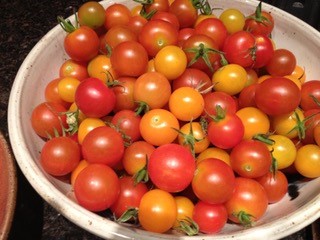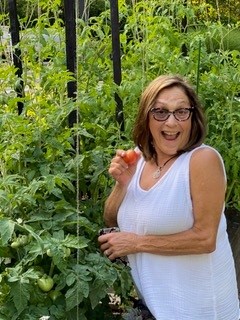by Robin Pollack, Fulton County Master Gardener Extension Volunteer
This article is part of Garden Buzz, a series from Appen Media and the North Fulton Master Gardeners, where rotating columnists explore horticulture topics like herbs, insects, and wildlife conservation. Find all Garden Buzz articles here.
I find it so rewarding having a fresh vegetable garden at home with a lot of nutritious vegetables and herbs that can be used all spring and summer and even saved to use throughout the winter. Growing my own healthy options is fun and gives me joy to share them with family and friends.


There are a few things to consider when you want to grow a healthy vegetable garden. Today I’d like to answer the top questions I always get asked.
Where should I put my garden?
Your garden’s location is very important. It needs to have 6-8 hours of sun daily. It is best near the house and near a source of water.
Why do I need a soil test?
The soil needs to be well drained with a good texture so amendments may need to be added if your site is not optimum. You should have a County Extension soil test to measure the pH of the soil and identify what nutrients are needed for healthy vegetables.
Why do I need a plan?
Before you try it in your pots or garden, it is important to plan your garden on paper. It is much easier (and cheaper) to adjust a plan on paper than to replant all your vegetables. Plant the crops that you and your family like to eat. If you have limited space, container gardening is a great option. Consider using dwarf varieties that will give you plenty of yield with a few plants. Tomatoes, peppers, eggplant and okra, along with your favorite herbs like oregano, basil, sage and thyme, will produce plenty to eat and share. Containers look great with a thriller (tall plant), like a dwarf or bush tomato or cherry tomatoes, a filler (short medium height) like basil, peppers or sage, and a spiller (something hanging down). Herbs like oregano or thyme are great for that.
What should I plant?
In your vegetable garden, plant tall-growing plants together on the north or west side of the garden or pot so they will not shade the lower-growing plants. Plan to use the space continuously by planting the next-in-season crops after the current crops have been harvested. Next to consider are the different varieties of plants as well as when to plant your vegetables.
Why do I need a planting schedule?
We live in hardiness zone 8a or 7b for Atlanta and north Georgia, and the last frost day is approximately April 15th. But it could be two weeks earlier or later because that is an average. Be sure to use recommended varieties for your garden and wait until the last frost has passed before planting in the spring. Whether buying seeds or plants, always buy the best quality seeds from a reputable company. When buying plants, purchase healthy plants without disease or insects present. Planting dates, spacing and depth are in the UGA Extension Vegetable Planting Chart, listed in the references.
How do I prepare my soil for spring planting?
Preparing the soil is important for vegetable gardening, whether raised beds or beds in the ground. Have a soil test done at your County Extension office for a small fee and they will send you an analysis and summary of your garden’s lime and fertilizer needs.
How much do I need to fertilize?
A pH of 6.0 to 6.5 is recommended for most vegetables whether raised beds or inground gardens. Vegetables are classified as light, medium or heavy feeders based on their fertilizer needs. Add fertilizer according to the soil test results. It’s good to start the soil prep early by adding organic matter such as compost, sawdust or chopped leaves if possible. Fertilizer should be mixed with the soil when preparing the soil for planting after the soil tests have told you what to add.
How do I control weeds, insects and disease?
It’s also important to control weeds, insects and diseases to prevent serious losses. Preventative measures can also be used for insects and disease or begun as soon as it is noticed. Your county extension office can help you with identification.
Why do I need to mulch?
A mulch of pine straw, leaves or compost will retain moisture and control weeds. Usually 2-4” is sufficient.
How much water do I give my plants?
It is also important to keep consistent moisture in the garden. Your garden needs will vary with the soil type, stage of growth, amount of rain and temperature. Usually, vegetable gardens need about 1-1 1/2 inches of water per week. Be sure and water early in the day to allow the leaves to dry off.
How can I best use my food?
Finally, enjoy your harvest by picking vegetables as soon as they are ripe to avoid disease and insect problems.
What to do with too much food?
Any surplus should be canned, frozen or shared as soon as harvested.
Happy gardening!
Learn More
About the Author

This week’s “Garden Buzz” features Sandy Springs resident Robin Pollack, an accomplished artist and Master Gardener. Active in the Atlanta art community since 1970, Robin has taught for over 30 years at Chastain Arts Center and has been a Master Gardener since 2005. As a member of North Fulton Master Gardeners, she has taught vegetable gardening at Farm Chastain and her own garden. Her garden, influenced by her artistic eye, has been featured on tours including Atlanta Botanical Garden and Georgia Perennial Plant Association.